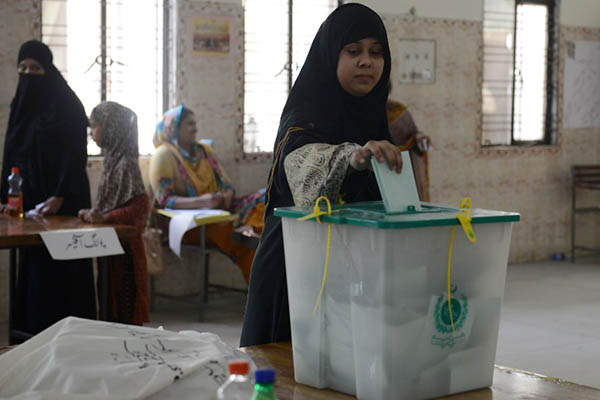
File photo. Arif Ali—AFP
Coalition of NGOs that observe general elections notes multiple risks, including legal and constitutional complications, under-registration of women voters
The Free and Fair Election Network (FAFEN) on Monday warned that it has identified “multiple constitutional, legal and operational challenges” that pose risks to early elections announced by President Arif Alvi after he dissolved the National Assembly following the controversial dismissal of a no-trust vote against Prime Minister Imran Khan.
Noting that the “constitutionality” of the actions that led to the dissolution of the National Assembly are pending in the Supreme Court of Pakistan, the organization said it hoped the matter would be decided without delay, as the prevailing constitutional deadlock could “potentially” translate into violent expression. “Political parties have a great responsibility to manage their workers and make sure that political disagreements do not turn into violence especially ahead of an early election,” it said in a statement.
Warning that an early election “may not be a smooth process,” it said the “most critical factor” for the legitimacy of any election was the completion of the Election Commission of Pakistan (ECP). Currently, the ECP has no members from Punjab or Khyber-Pakhtunkhwa, with the process to appoint them unclear in the absence of an elected National Assembly, as the prime minister and the leader of the opposition must jointly form a committee of senators to pick ECP members.
FAFEN also warned of the constitutional and legal status of the current delimitation of National and Provincial Assembly seats, noting it had been carried out on the basis of provisional results of the 2017 census. The Pakistan Tehreek-e-Insaf (PTI)-led government had, in February, announced it would conduct a new census in August. “The 25th Constitutional Amendment Act, 2017 through a proviso to Article 51(5) of the Constitution provided for only a one-time exception to delimitations on the basis of provisional census results for GE-2018,” said FAFEN, adding a fresh delimitation was essential for the legality of future elections as per Section 17(2) of the Elections Act, 2017. “However, the process of delimitation cannot be completed within three months as per the requirements of Chapter III of the Elections Act, 2017 and corresponding rules,” it added.
FAFEN also noted the confusion over the use of electronic voting machines and granting overseas Pakistanis the right of internet voting, as detailed in new amendments to the Elections Act, 2017. “FAFEN has always urged the need for electoral reforms through political consensus as majoritarian changes to election law always lead to challenges to the legitimacy of the election outcome and political stability,” it said, noting the opposition had not supported the government’s move. “Nevertheless, there is a need to grant representation to overseas Pakistanis as all political parties have made such commitments to the country’s diaspora in their election manifestoes,” it added.
The coalition also noted the under-registration of women on the electoral rolls as a “major issue” that was being addressed by the ECP. “There still are 11.37 million women who remain unregistered as voters,” it said, noting that electoral rolls must be frozen 30 days before the announcement of the election program as per Section 39 of the Elections Act, which could render millions of women voters disenfranchised. “Another challenge to early elections is the operational and logistical preparation by the ECP involving recruiting and training around one million polling staff, and printing, publishing and transportation of election materials as well as selection of locations for more than 10,000 polling stations that are to be established due to the addition of more than 15 million voters on the electoral rolls since GE-2018,” it said. “The quality of these critical electoral processes is vital to the integrity of any election,” it added.
“FAFEN believes in the continuity of the democratic process as the only way to resolve the political disputes and disagreements particularly related to the country’s election system. Even sincere efforts to correct the election system-related issues that are devoid of a larger political consensus will be counter-productive and will add to post-election political instability. Protecting the integrity of any future election is vital to strengthening democracy as well as ensuring the much-needed stability of political institutions that is critical to the country’s social and economic development,” it added.
Not enough time
Meanwhile, daily Dawn reported that a senior official of the ECP, on the condition of anonymity, had said three months was insufficient for it to conduct general elections. Stressing that at least six months were required for fresh delimitation of constituencies and updating of electoral rolls, the official also validated FAFEN’s concerns over the appointment and training of polling staff.
The official also cited some legal issues, noting that under Section 14 of the Elections Act, the ECP was to announce an election plan four months prior to polls. He said the law requiring use of EVMs and giving overseas Pakistanis voting rights was also difficult to implement in this time period. He also warned that if the general elections took place in three months, the ECP would have to cancel local government elections, as there would not be enough time for both.
The ECP has clarified that it has not offered any formal statement on the conduct of the general elections.
